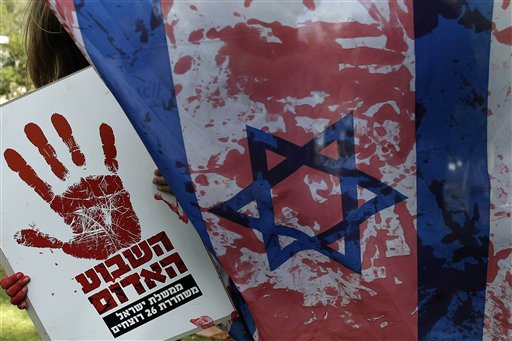JERUSALEM — Israel began the process of releasing 26 Palestinian prisoners late Tuesday, an initial gesture on the eve of renewed Mideast negotiations.
Videos By Rare
Thousands of Palestinians have spent time in Israeli prisons since Israel’s capture of the West Bank, Gaza and east Jerusalem in 1967. They were jailed on charges ranging from throwing rocks to killing civilians in bombings and other attacks.
The decision to release the men has stirred anguish in Israel, particularly among the relatives of those killed in attacks. Meanwhile celebrations were planned in the Palestinian territory, where Palestinians generally view the prisoners as heroes, regardless of their acts, arguing they made personal sacrifices in the struggle for independence.
The Israeli prison service said buses carrying the inmates left the Ayalon jail in central Israel late Tuesday. Israel released them late at night to prevent a spectacle. Some protesters tried in a symbolic move to block the buses from leaving the jail.
Most of the prisoners were convicted of killings, including Israeli civilians and suspected Palestinian collaborators, while others were involved in attempted murder or kidnapping.
The release of the prisoners was part of an agreement brokered by U.S. Secretary of State John Kerry to get Israel and the Palestinians back to the table for peace talks that had been paralyzed since 2008. In all, 104 convicts are to be released in four batches, although their freedom is contingent on progress in peace talks.
Israelis and Palestinians are to launch talks in Jerusalem on Wednesday, following a preparatory round two weeks ago in Washington. The prisoner release is part of an agreement to restart the talks after a five-year freeze.
Israel’s Prison Service posted the 26 names online Monday to allow two days for possible court appeals. Israel’s Supreme Court rejected an appeal by families of those killed by the prisoners earlier Tuesday.
Most of the prisoners already have served around 20 years, with the longest-held arrested in 1985. Fourteen of the prisoners were to be released to the Gaza Strip and 12 to the West Bank.
Most Israelis view those involved in killings as terrorists for killing civilians. Relatives of those killed by the inmates protested the night before against their release. Protesters dipped their hands in red paint to symbolize what they said was the blood on the hands of the prisoners.
Earlier Tuesday, Israel said it is moving forward with building nearly 900 new homes in east Jerusalem, a decision that angered Palestinians a day before the talks.
The last round of substantive talks collapsed in late 2008, and negotiations have remained stalled mainly over the issue of Israeli settlement construction on territories claimed by the Palestinians for their future state. The Palestinians say the settlements, now home to more than 500,000 Israelis, is making it increasingly difficult to carve out their state and that continued Israeli construction is a sign of bad faith.
Hanan Ashrawi, a senior Palestinian official, said Israel’s settlement plans are a slap in the face of the Palestinians and Kerry. “It is not just deliberate sabotage of the talks, but really a destruction of the outcome,” she said.
Ashrawi urged Kerry “to stand up to Israel” and deliver a tough response.
Mark Regev, a spokesman for Israeli Prime Minister Benjamin Netanyahu, rejected the Palestinian claim.
“The Palestinians know that Israel rejected their demands of a settlement freeze as a precondition to these talks, they cannot say otherwise,” Regev said. “The construction that the Israeli government authorized is all in Jerusalem and the large blocs, in areas that will remain part of Israel in any possible final status agreement and this construction that has been authorized in no way changes the final map of peace,” said Regev.
The U.S. had no immediate comment. On Monday, Kerry repeated the U.S. position that the settlements are “illegitimate,” while saying he didn’t think the recent flap over Israeli settlements would delay talks. “I’m sure we will work out a path forward,” Kerry said.
The latest construction is to take place in Gilo, an area in east Jerusalem that Israel considers to be a neighborhood of its capital. Israel’s annexation of east Jerusalem, which the Palestinians claim as their capital, is not internationally recognized.
The housing plan, which received initial approval last year, would expand Gilo’s boundaries further toward a Palestinian neighborhood. The plans for 900 housing units in Gilo come in addition to an earlier announcement this week of some 1,200 other settlement homes in the West Bank and east Jerusalem.
Efrat Orbach, an Interior Ministry spokeswoman, confirmed that approval had been given for the Gilo expansion. She said more approvals are needed before construction begins. But Lior Amihai of anti-settlement group Peace Now, said the plan needs no further approval and construction could begin within weeks.
The Palestinians had refused to resume negotiations with Israel unless it halted settlement construction. Israel has refused.
After six trips to the region, Kerry managed to persuade Palestinian President Mahmoud Abbas to drop the settlement issue as a condition for negotiations to start. In exchange, Israel agreed to release 104 Palestinianprisoners.

